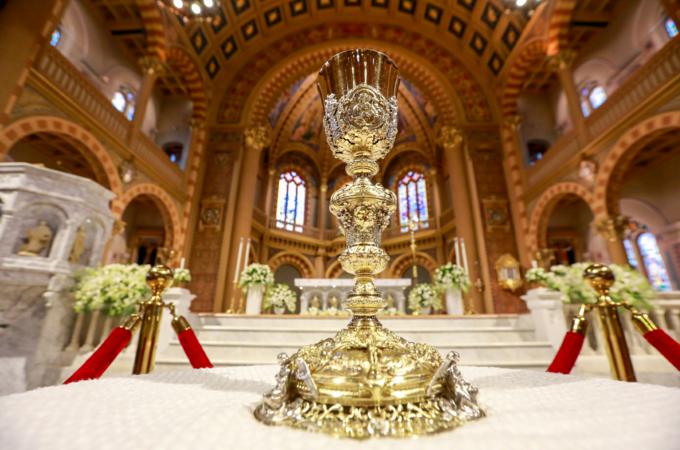The coronavirus and us
I could write about something other than the coronavirus pandemic, but right now it almost seems there isn't anything else.
The rapid spread of the virus, its death toll, its prospect of overwhelming our health care system, its economic consequences burdening so many people's lives, the need to practice "social distancing" and self-isolation, the uncertainty as to how long it will disrupt our life together -- these are valid reasons for worry and anxiety.
Like most crises, this one has called forth what is most noble in the human spirit.
Priests who are obeying Pope Francis' call to have courage and continue to visit the sick. The volunteers at my local food bank, who worked out how to keep getting food to the needy while taking all precautions against contagion. The dedicated health care personnel who have exhausted themselves and incurred great risk caring for the sick.
May God bless these people and inspire us with their example.
The outbreak also teaches us that a great many Catholics are hungry for the Mass, and for receiving Communion. Given opinion polls suggesting that many Catholics lack a sound belief in the real presence of Jesus Christ in the Eucharist, this is strangely reassuring.
It is difficult, and should be difficult, to give up even temporarily what our faith recognizes as the source and summit of the Christian life.
In response, FORMED and Magnificat have opened their online resources to everyone for free, to help Catholics receive spiritual nourishment while Masses and public gatherings are suspended.
My local consortium of five parishes has a new Facebook page, providing Sunday Masses on video and other resources, and Auxiliary Bishop Robert E. Barron of Los Angeles is offering a daily Mass online through "Word on Fire" with a prayer for spiritual communion with Jesus.
The Church's response has also inspired second-guessing among some Catholics.
When state authorities suspended public gatherings in the three counties immediately around Seattle, I confess that I wondered why the archbishop of Seattle suspended Masses in the larger area of the archdiocese.
Then I realized that otherwise, Catholics in those three counties would flock to our other churches and make them more crowded (and dangerous) than before, which happened elsewhere when one diocese closed churches and the neighboring one did not.
By ensuring that we do not spread the virus to others who are vulnerable, we are indeed showing our love for the body of Christ to which we belong.
Some Catholics nonetheless suggest that all this is an overreaction, based on a secular society's irrational fear of death as the ultimate evil. For Christians, they say, there are worse things than death, and our hope in the resurrection should transcend our fear of death. That much is true.
But the conclusion some might draw from this is especially untimely, as I write this on the 25th anniversary of St. John Paul II's magnificent encyclical "Evangelium Vitae" ("The Gospel of Life"). He urged "a general mobilization of consciences and a united ethical effort to activate a great campaign in support of life" (No. 95).
He based this call not on fear of death but on love and respect for the lives of other human beings made in the image and likeness of God -- and on the insight that we live up to our own vocation through "the sincere gift of self" (No. 25).
To give up in-person gatherings with our friends and neighbors to protect their lives and health is a great sacrifice. That makes it an opportunity to live more fully our Christian calling.
- Richard Doerflinger worked for 36 years in the Secretariat of Pro-Life Activities of the U.S. Conference of Catholic Bishops. He writes from Washington state.



















